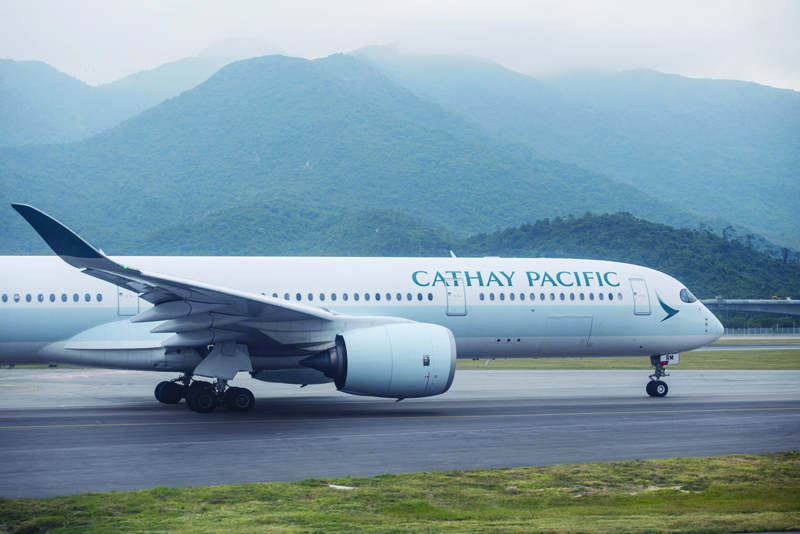HONG KONG: Hong Kong carrier Cathay Pacific said yesterday it suffered a record $2.8 billion loss last year as the coronavirus pandemic wiped out demand for travel-and the airline warned of a long road to recovery ahead. Chairman Patrick Healy described 2020 as the "most challenging" in the airline's 70-year history and said much will now depend on how effective and widespread global vaccination programs are.
"It is by no means clear how the pandemic and its impact will develop over the coming months," he warned, saying the group expected passenger traffic to remain "well below" half of pre-pandemic levels throughout 2021. The company's losses were higher than estimates compiled by Bloomberg News. Cathay racked up an attributable loss of HK$21.6 billion ($2.8 billion) for 2020, going deeper into the red as the year wore on. Its second half losses clocked in at HK$11.8 billion, up from HK$9.9 billion in the first six months of the year when the pandemic first emerged.
Like all major airlines, Cathay Pacific has seen its business evaporate during the coronavirus pandemic but the Hong Kong carrier has had an especially torrid year because it has no domestic market to fall back on. It also entered the pandemic in an already vulnerable position. When the coronavirus first emerged Hong Kog had fallen into recession and Cathay Pacific in the red as months of huge and disruptive democracy protests in 2019 led to a plunge in customers, especially from the lucrative mainland Chinese market. The airline also found itself punished by authorities in Beijing because some of its employees joined or voiced support for the protests.
First vaccinations
As the pandemic spread, the airline went on a cost-cutting spree, closing its Cathay Dragon subsidiary, making about 8,500 redundancies and slashing executive pay. With the help of a government bailout it underwent a recapitalization in July that raised HK$39 billion. But passenger numbers have been some 98 percent below pre-pandemic levels since April and for much of last year the company was burning through cash at a rate of up to HK$1.5 billion a month. By the time 2020 closed, Cathay's shares had fallen 29 percent for the year.
In Wednesday's annual report, Cathay said it had managed to reduce the cash burn towards the end of the year but longer quarantine restrictions that Hong Kong placed on all long-distance flight crew in January was now cancelling out most of those savings. Cathay said it would keep executive pay slashed and ask staff to go on a third round of unpaid leave-to which some 80 percent of employees have already signed up.
Its liquidity at the end of 2020 was HK$28.6 billion and Cathay also issued HK$6.74 billion in convertible bonds in January to secure more funds. Hong Kong managed to keep coronavirus infections comparatively low by bringing in strict quarantine measures for all arrivals early on in the pandemic.
Currently, most of those arriving in the city must quarantine in a hotel for 21 days, one of the longest mandatory quarantine periods in the world. Outbound travel is almost non-existent. And there is little sign of those measures being lifted any time soon. The first vaccinations began last month but so far only 114,000 of the city's 7.5 million population have received a first dose, the vast majority China's Sinovac jab. Authorities say they hope to vaccinate all residents by the end of the year. Last week, the head of the city's tourist board warned it could be at least six months before residents would be able to travel again. - AFP



